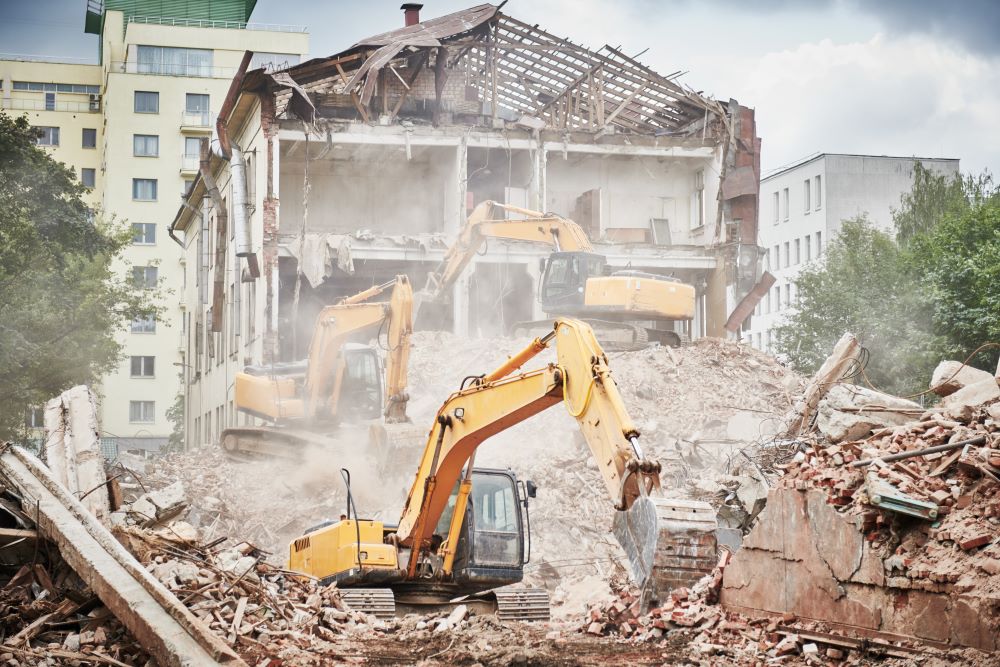
Commercial Demolition Contractors: Project Management Tips
Do you need professional guidance on overseeing commercial demolition projects? There’s nowhere else to look! We’ll provide helpful project management advice for commercial demolition contractors in this post. For any demolition project to be successful, whether it’s demolishing a high-rise structure or remodeling a shop space, careful planning and execution are crucial.
Being seasoned professionals, we are aware of the difficulties and nuances associated with commercial demolitions. There are several things to take into account, from securing the required permissions to guaranteeing safety procedures. For your convenience, we have put together a thorough guide to ensure a seamless transaction.
OUR SERVICES
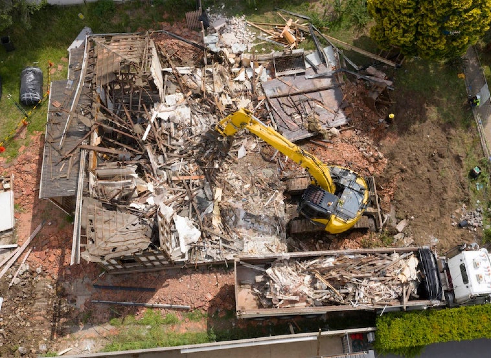
Structure Demolition. Residential, Commercial & Industrial
If your structure poses a health, safety, or environmental risk, demolition can prevent costly citations or fatal accidents. While this may seem daunting, you are just a phone call away from having your residential demolition done professionally, responsibly, and at a great price.
Talk to a Demolition Specialist Now! 916.249.5001
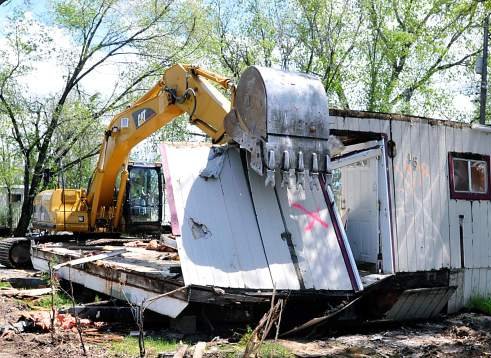
Mobile Home Demolition
We demolish and haul away mobile homes. Any size, anywhere, anyhow. We are fast, clean and competitive. We serve most of Northern California. There are many factors to consider when removing or demolishing your old trailer, mobile home, or manufactured home like: the processes involved, costs, time, contractors, debris, and permits.
Talk to a Demolition Specialist Now! 916.249.5001
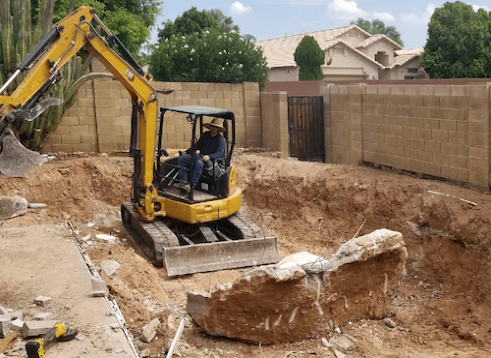
Pool Demolition
When removing a pool in Sacramento, California with the professional demolition team of Maxton Demo, you’re guaranteed peace of mind from beginning to end. From your initial request for an estimate to clean-up, you can expect our pool demolition process that’s completely professional and safe.
Talk to a Demolition Specialist Now! 916.249.5001
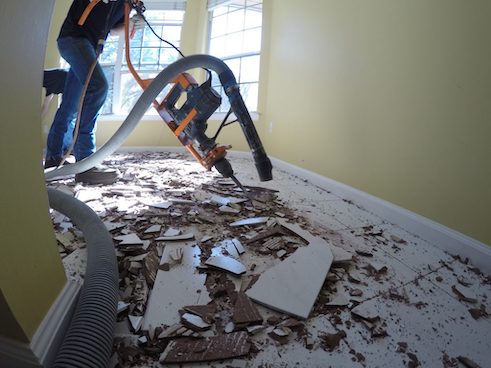
Floor Demolition
Flooring demolition, like any other major home renovation work, requires a specific set of skills and tools to be performed properly. You need experts in flooring demolition to get you the best floors possible. Contact us to find out more about how we can help you today.
Talk to a Demolition Specialist Now! 916.249.5001
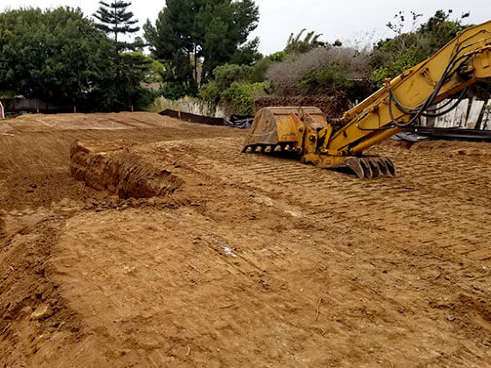
Grading & Excavating
If you need an experienced excavator and grader in Sacramento, call us today. One of the many reasons that residential, commercial, and industrial customers choose to work with us is because we’re able to provide a broad range of services to help construction-related projects get done in less time and at a reduced cost.
Talk to a Demolition Specialist Now! 916.249.5001

Roof Snow Removal
Heavy snow & ice dams can cause significant roof and home damage. Roof Snow removal is our specialty during the winter months. Serving the Sacramento, California area for 10 years, we can get your roof snow removed and promise a quick response and reasonable rates.
Talk to a Demolition Specialist Now! 916.249.5001
Comprehending Commercial Demolition
Commercial demolition is a complex operation that involves careful planning, accuracy, and regulatory compliance in addition to just demolishing structures. It is crucial to realize that the extent and complexity of commercial demolition projects vary greatly, ranging from modest retail premises to enormous industrial complexes. Every project has its own set of particular risks and obstacles.
Skilled demolition contractors know how to evaluate each project’s unique requirements, accounting for the size of the building, the materials needed, and the project’s influence on the environment. Whether it is selective demolition, implosion, or conventional mechanical techniques, choosing the best demolition technique depends on the results of this preliminary evaluation. To successfully manage a commercial demolition project, one must first understand its nature.
Furthermore, contractors need to keep up with the most recent advancements in the industry due to the rapid advancement of demolition technology and processes. Modern machinery, such as demolition robots and high-reach excavators, may improve productivity and security. Therefore, a thorough grasp of commercial demolition is essential to the success of the project and guarantees that contractors can confidently and expertly handle the complexity of the work at hand.
The Value Of Employing Skilled Demotion Contractors
One cannot stress the importance of hiring qualified demolition professionals. These professionals ensure that projects are carried out safely, effectively, and in accordance with all applicable rules by bringing a wealth of expertise and experience to the table. Expert contractors are prepared to tackle any of the many difficulties that may occur during a demolition job, from the discovery of dangerous materials to unforeseen structural problems.
Selecting the appropriate contractor is essential for risk management as well. There are hazards associated with demolition operations, not just for the workers but also for the people and environment around them. Expert contractors have extensive experience reducing these hazards by putting in place thorough safety and environmental protection protocols. In addition, they have the required insurance and permits, giving project owners peace of mind.
Professional demolition contractors also recognize the need for careful project management and planning. They are adept at organizing the many stages of a demolition job, making sure that everything is completed on schedule and with maximum efficiency. Professional contractors manage every part of the project, from securing the required permissions to handling garbage disposal, which expedites the procedure and prevents expensive delays.
Commercial Demolition Contractors’ Obligations
A commercial demolition contractor plays a variety of roles. Contractors are first and foremost responsible for making sure that all demolition work is done safely. This entails carrying out risk analyses, putting safety precautions in place, and educating employees on appropriate safety procedures.
Before construction starts, contractors are also in charge of securing the required permissions and licenses. Having to comply with several rules and regulations and numerous regulatory agencies may make this a complicated procedure.
Contractors are responsible for overseeing not just safety and legal compliance but also the logistics of the demolition operation. This entails making the appropriate equipment selections, organizing the debris collection process, and limiting disturbances to the surrounding region. To effectively carry out these duties, effective project management is essential.
A Commercial Demolition Project’s Phases
A commercial demolition project may be executed in a few major stages, each requiring meticulous planning and attention to detail. Contractors and project owners alike must comprehend these stages since they provide a structure for overseeing the project from inception to completion.
Pre-Demolition Scheduling And Site Evaluation
A detailed site survey and elaborate planning are part of the first step. This entails carrying out surveys to find any potentially dangerous elements, evaluating the building’s structural soundness, and choosing the most effective demolition technique. Contractors must also create a thorough project plan that includes the schedule, budget, and scope of work.
A further aspect of pre-demotion preparation is obtaining the required licenses. There are many municipal, state, and federal restrictions governing demolition projects, and obtaining the wrong permissions may cause serious delays and penalties. Skilled contractors are adept at navigating the regulatory environment and are conversant with the permitting procedure.
Assessing a site involves more than just seeing possible problems; it also involves taking advantage of material salvage and recycling possibilities. Reusable or recyclable materials are produced by many commercial demolition projects, which promote sustainability and may partially offset project expenses.
Project Management for Commercial Rehabilitation Initiatives
Establishing the groundwork for a demolition project’s success at the planning stage is essential. It begins with a detailed inspection of the building that has to be taken down. This involves assessing the building’s structural integrity, the materials that were utilized in its construction, and the existence of any hazardous compounds.
Builders may create a comprehensive demolition schedule based on this evaluation. This plan should include the demolition technique, the tools required, and the procedures for disposing of the garbage. It should also include a budget that details all anticipated expenses and a project timetable.
Making backup plans and recognizing possible hazards are other components of effective project planning. Being ready for obstacles like unforeseen structural problems or delays in acquiring permissions might help keep the project on schedule.
Effective Project Scheduling by Commercial Demolition Contractors
The foundation of every well-completed commercial demolition project is effective project planning. It makes the difference between precisely achieving deadlines and incurring expensive delays. This planning stage is crucial because it establishes the operating plan and guarantees that all team members are in sync with the project’s objectives and schedules. A well-crafted strategy accounts for every potential obstacle, guaranteeing seamless project progression free from unanticipated setbacks.
A well-considered strategy also makes the most use of available resources, guaranteeing that each team member and piece of equipment is put to the best possible use. This efficiency takes into account cost-effectiveness, environmental responsibility, and safety, in addition to time savings. Commercial demolition businesses may limit their ecological imprint, lower risks, and eliminate needless expenditures by carefully planning every stage of the demolition process.
Moreover, keeping lines of communication open with all stakeholders depends on effective project planning. It promotes an open and reliable relationship by making sure that customers, contractors, and local authorities are informed at every step of the demolition. This degree of cooperation is essential for making decisions on time and for handling any problems that could come up while the project is underway.
Effective Project Planning Is Crucial
Effective project management is essential for any demolition project to be successful. Without it, projects are vulnerable to safety risks, budget overruns, and delays; thus, it is crucial to give planning top priority right away.
A clear project plan directs each stage of the demolition operation like a road map. It assists in anticipating possible problems and creating plans to successfully address them. Effective planning also makes sure that the project’s needs are fulfilled on schedule and within the allocated budget, which maximizes customer satisfaction.
Moreover, the necessity of careful preparation cannot be overemphasized in the field of commercial demolition, where the stakes are quite high. It minimizes environmental effects while ensuring worker and public safety in accordance with ethical and regulatory norms.
Setting Project Objectives And Goals
For any commercial demolition project to be successful, it is essential to set specific, attainable goals and objectives. These objectives provide the project direction and act as standards by which its progress may be evaluated.
SMART stands for specified, measurable, attainable, relevant, and time-bound, and it guarantees that goals are realistic but also demanding. They should include every facet of the project, from financial and schedule restrictions to safety and environmental concerns.
Furthermore, setting these objectives early on promotes good communication and coordination between all project participants, encouraging teamwork and guaranteeing that everyone is working toward the same goal.
First Evaluation and Site Study
A detailed evaluation and study of the site are essential before starting any demolition work. This first phase involves assessing the physical state of the building, locating potentially dangerous elements, and comprehending the surroundings. Such a thorough examination helps in developing a demolition technique that is effective and safe.
Examining the design and materials of the building is another aspect of the site investigation. Knowing this is essential to choosing the right strategy for taking down the building. For example, lead or asbestos may be present in older buildings, which calls for specific handling and disposal techniques. Early detection of hazardous chemicals is essential to guaranteeing public and worker safety.
Comprehending the geographical context of the site may also help identify possible obstacles like close proximity to neighboring buildings, accessibility problems, or environmental constraints. By taking into consideration all outside variables that can have an influence on the project, this stage guarantees that the demolition plan is practical and realistic.
Compliance with Regulations and Permits
Getting the required permissions and navigating the regulatory compliance labyrinth are tasks that call for specialized expertise and close attention to detail. In order to safeguard public health, preserve historical sites, and save the environment, demolition operations are strictly controlled. Adherence to these standards is mandatory; it’s an essential part of the planning procedure.
Obtaining the necessary permissions is a difficult procedure that varies greatly based on the project’s location and specifications. It entails communicating with local officials, completing environmental impact evaluations, and presenting comprehensive plans. While this process might be time-consuming, it is necessary to prevent legal hazards and guarantee uninterrupted project progress.
Furthermore, it is essential for commercial demolition businesses to be up-to-date with the latest rules and industry standards. Laws and regulations are subject to change, and breaking them may result in expensive penalties or even the termination of a project. As such, a large amount of project preparation goes into comprehending and meeting these needs.
Risk Reduction and Safety Measures
The demolition industry is, by its very nature, dangerous, with risks lurking around every corner. Thus, the most important aspects of project planning are risk management and safety measures. Early risk identification enables the creation of mitigation methods, protecting both the public and employees from harm.
Beyond personal protective equipment (PPE), safety precautions are necessary. These include making thorough evacuation plans, setting up effective lines of communication, and doing frequent safety exercises. Throughout the project, these safety measures are constantly evaluated and adjusted to reflect changing circumstances and obstacles.
Securing the location to thwart illegal entry and possible mishaps is another aspect of risk management. This includes enclosing the space with a fence, keeping an eye on site access, and putting in place stringent safety measures. Commercial demolition contractors may maintain their reputation for dependability and expertise by putting safety first.
Choosing the Proper Tools and Technology
Technological developments in demolition have completely changed the way buildings are taken down. Making the correct technological and equipment choices is essential to improving accuracy, safety, and efficiency. The selection of equipment, which might range from remote-controlled demolition robots to high-reach excavators, can have a big influence on the project’s success.
Purchasing the newest equipment reduces the possibility of casualties and structural damage while also expediting the demolition process. For huge buildings, for instance, using precise demolition methods such as explosive demolition may be the most effective approach, although it does require specialized equipment and knowledge.
Furthermore, recycling and trash management are greatly aided by contemporary technologies. The project’s sustainability objectives are furthered by the recovery of valuable materials made possible by sophisticated sorting and processing equipment. By selling the salvaged materials, this may have a positive financial effect in addition to reducing the impact on the environment.
Creating a Comprehensive Project Schedule
The road plan that directs the demolition procedure from beginning to end is a comprehensive project timetable. It guarantees that the project moves forward logically and effectively by outlining important deadlines, dependencies, and milestones. It needs a thorough grasp of the demolition procedure and the capacity to foresee possible obstacles to develop this timeframe.
The timeline serves as a communication tool that keeps all parties informed, not only as a timetable. It facilitates resource management, task coordination, and well-informed decision-making. The timetable must be updated and revised on a regular basis to account for modifications to the project’s scope and unanticipated delays.
Additionally, a well-thought-out timeframe raises stakeholder satisfaction. It gives customers an accurate view of the project’s status, fostering trust and confidence. The demolition contractors dedication to effectiveness and expertise is further shown by the timely fulfillment of milestones.
Budget Management and Resource Allocation
A demolition project’s ability to allocate resources and manage a budget effectively are critical components of its success. They include meticulous planning of the use of resources, including labor, tools, and supplies, in order to accomplish project objectives within the allotted spending limit. This calls for both strategic preparation and the adaptability to overcome unanticipated obstacles.
A thorough cost analysis is one of the first stages in controlling a project’s budget. This includes projecting the price of labor, renting equipment, disposing of materials, and any other potential costs. Knowing exactly what these expenditures include makes it easier to create a reasonable budget and spot areas where spending may be cut.
Furthermore, it is essential to continuously monitor the spending and allocation of resources. This enables project managers to make timely modifications, guaranteeing the project’s financial progress. Effective budget management not only impacts the project’s profitability but also fosters customer confidence by exhibiting financial accountability.
The Best Methods for Eco-Friendly Demolition
In this sector, sustainable demolition techniques are gaining importance. With an emphasis on resource conservation, emissions reduction, and trash diversion from landfills, they aim to minimize the environmental effects of demolition operations. Adopting these procedures calls for both thorough preparation and a dedication to sustainability.
Deconstruction is one of the main tactics for sustainable demolition. Using this technique, buildings are methodically disassembled in order to save elements for recycling or reuse. Even though it takes longer than conventional demolition, deconstruction promotes a circular economy and drastically lowers waste.
Furthermore, choosing the appropriate non-reusable material disposal techniques is essential for sustainability. Finding approved recycling businesses and waste-to-energy facilities that can handle demolition trash in an ethical manner is part of this. Commercial demolition businesses may help save the environment and satisfy the increasing demand for green demolition services by putting a priority on sustainable methods.
The Secrets to Planning a Successful Commercial Demolition
To sum up, effective project planning is essential to the success of commercial demolition projects. It covers a broad spectrum of factors, including risk management, resource allocation, sustainability, and regulatory compliance, in addition to the first site evaluation and compliance. Commercial demolition contractors may guarantee the timely, safe, and economical completion of their projects by following these guidelines.
In the cutthroat demolition sector, using cutting-edge technology and environmentally friendly procedures may also help a business stand out. It exhibits a dedication to quality, security, and environmental stewardship. In the end, careful planning, smart execution, and ongoing improvement are essential for project planning success.
In commercial demolition, the process from design to implementation is intricate yet worthwhile. Demolition businesses have the ability to turn obstacles into possibilities by adopting the proper strategy, opening the door for further urban growth and advancement.
Do you have a Question?
Talk to a Demolition Specialist Now! 916.249.5001
Request Formal Quote